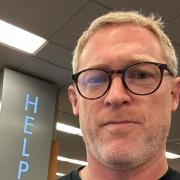Health
Sandor Katz and the tiny wild
Jacqueline Briggs Martin
j641.61 Martin
Biographies, Health, LGBTQ+
Welcome to Sandor Katz's no-desk, new-ways school! There are no tests, no rules - just happy, hungry people learning how to make fermented food. All they need are their favorite vegetables, salt, and the TINY WILD. These invisible microbes change cucumbers into crunchy pickles, and cabbages into zingy-zangy sauerkraut and kimchi.
Raising LGBTQ: allies A parent's guide to changing the messages from the playground
Chris Tompkins
649.1/Tompkins (NEW SHELF)
LGBTQ+, Nonfiction, Health
Books are like messengers, Tompkins writes, and this volume conveys essential information for all adults with children in their lives about what it means to be LGBTQ, in the context of what he calls MFTP: Messages from the Playground. Playground is meant metaphorically, of course, as are messages. Playground is our mind or, rather, our consciousness, while messages are the dominant societal worldview. Tompkins says that one of the goals of his useful book is to help prevent bullying, heal queerphobia, and create allies on the playground. To this end, he writes extensively of his own experiences as a teacher and counselor with the goal of making the experience of having an LGBTQ child—or knowing one—something to revere. This is a tall order, but Tompkins rises to the occasion, offering thoughtful, informed, affirming, and, yes, inspirational advice on how to change a homophobic and transphobic society. In that context, he invites readers to change their traditional thinking and in so doing to eliminate queerphobia by being open and honest with children. He has succeeded beautifully. Copyright 2021 Booklist Reviews.
Added by Candice
Why Buddhism is true : the science and philosophy of meditation and enlightenment
Robert Wright
294.342 /Wright
Nonfiction, Self Help, Health, Science, Philosophy
Author Robert Wright shows how Buddhist meditative practice can loosen the grip of anxiety, regret, and hatred, and deepen your appreciation of beauty and other people. -- Adapted from book jacket.
A fantastic look at the scientific aspects of Buddhism, specifically mindfulness meditation. -Mykle
Transgender children and youth
Elijah C. Nealy
306.768/Nealy
Nonfiction, LGBTQ+, Health
A comprehensive guide to the medical, emotional, and social issues of trans kids. These days, it is practically impossible not to hear about some aspect of transgender life. Whether it is the bathroom issue in North Carolina, trans people in the military, or on television, trans life has become front and center after years of marginalization. And kids are coming out as trans at younger and younger ages, which is a good thing for them. But what written resources are available to parents, teachers, and mental health professionals who need to support these children? Elijah C. Nealy, a therapist and former deputy executive director of New York City's LGBT Community Center, and himself a trans man, has written the first-ever comprehensive guide to understanding, supporting, and welcoming trans kids. Covering everything from family life to school and mental health issues, as well as the physical, social, and emotional aspects of transition, this book is full of best practices to support trans kids.
Added by Candice
Big feelings : how to be okay when things are not okay
Liz Fosslien
152.4 /Fosslien
Nonfiction, Health, Self Help
We all experience unwieldy feelings. But between our emotion-phobic society and the debilitating uncertainty of modern times, we usually don't know how to talk about what we're going through, much less handle it. Over the past year, Liz Fosslien and Mollie West Duffy’s online community has laughed and cried about productivity guilt, pandemic anxiety, and Zoom fatigue. Now, Big Feelings addresses anyone intimidated by oversized feelings they can't predict or control, offering the tools to understand what's really going on, find comfort, and face the future with a sense of newfound agency. Weaving surprising science with personal stories and original illustrations, each chapter examines one uncomfortable feeling—like envy, burnout, and anxiety—and lays out strategies for turning big emotions into manageable ones. You’ll learn: • How to end the cycle of intrusive thoughts brought on by regret, and instead use this feeling as a compass for making decisions • How to identify what’s behind your anger and communicate it productively, without putting people on the defensive • Why we might be suffering from perfectionism even if we feel far from perfect, and how to detach your self-worth from what you do Big Feelings helps us understand that difficult emotions are not abnormal, and that we can emerge from them with a deeper sense of meaning. We can’t stop emotions from bubbling up, but we can learn how to make peace with them.
Alright, so I'm only through the introduction, but what drew me to this book is the title itself: Big Feelings. I've heard this term used within the mental health field as well as with children trying to learn what their emotions are telling them. I am already finding it useful. Seeing a mood chart anyone can draw on their own, and reading that one cannot deal with big feelings until they unpack them, makes me look forward to delving in to the triggers they discuss. The simple and relatable illustrations also describe what words cant. Looking forward to digging in. -Melody
Fans : how watching sports makes us happier, healthier, and more understanding
Larry Olmsted
796 /Olmsted
Sports, Health, Self Help
"Research into sports fandom makes the sometimes counterintuitive case for why being a fan is good for us individually and is a force for positive change in our society"--
This book is for the fan devastated by loss, the skeptic who sees no value in sports fandom, and the fan making the case to that skeptic. -Tom
Trauma stewardship : an everyday guide to caring for self while caring for others
Laura van Dernoot Lipsky
610 /Lipsky
Nonfiction, Health
Offers a look at the many ways the stress of dealing with trauma manifests itself: feelings of helplessness and hopelessness, diminished creativity, chronic exhaustion, cynicism, and more. This title presents a variety of simple practices that enable us to look carefully at our reactions and motivations and discover sources of energy and renewal.
We know mental health crises are a huge side effect of the COVID-19 pandemic. This book is for anyone experiencing secondary trauma while providing services or support to people living with their own trauma. I learned about this book from a webinar about library service, one that acknowledged public service work can have a negative impact on on the worker's mental health. Trauma Stewardship is an excellent guide for anyone working in public service, mental health, or even the school system. It's the serious side of "self-care" (you don't have to be in a bubble bath to get something out of it). Stuffing feelings down after experiencing a traumatic experience with the public you serve will leave you burnt out. This book provides the tools to create space to care for your own mental health. -Melody
Successful aging : a neuroscientist explores the power and potential of our lives
Daniel J. Levitin
612.82 /Levitin
Health, Science
Recent studies show that our decision-making skills improve as we age, and that our happiness levels peak at age eighty-two. Levitin examines the neuroscientific evidence to challenge many of the beliefs that surround aging. He provides realistic plans for how you can make the most of your seventies, eighties, and nineties today-- no matter how old you are now. -- adapted from jacket
Even though I am physically a couple decades away from the 60+ years developmental stage this book is most applicable to, I found the research done and compiled in this book to be both fascinating and enlightening. For me some key takeaways were; 1. Always try new things for neuroplasticity, for example, new hobbies, travel to new places, try new technologies. 2. Be social, particularly intergenerational, every generation has different qualities to offer. 3 Move your bodies, preferably outside. Survival skills are engaged even on a walk around the neighborhood because of the potential for unknown variables, and it keeps your body and mind sharp. This book is full of resilience strategies and practical, cognitive enhancing tricks everyone should do as they age as well as an appreciation for what we can learn from the wisdom of older generations. -Mari
Feel better in 5 : your daily plan to feel great for life
Rangan Chatterjee
613 /Chatterjee
Nonfiction, Health
"If you’ve ever started an intensive plan only to stop days, weeks or months later, or struggled to prioritise your health, it’s not your fault – behavioural science shows that most plans simply aren’t built to last. Feel Better in 5 is the first daily 5 minute plan that is easy to maintain, easy-to-follow and requires only the smallest amount of willpower. Drawing on Dr Rangan Chatterjee’s twenty years of experience and real-life case studies from his GP practice, Feel Better in 5 is your daily plan for a happier, healthier you at no extra cost." --From https://drchatterjee.com/.
I might not have an hour, but I do have 5 minutes! -Melody
The how not to die cookbook : 100+ recipes to help prevent and reverse disease
Michael Greger
641.56362 /Greger
Nonfiction, Health
Dr. Michael Greger's first book, "How Not to Die," presented the scientific evidence behind the only diet that can prevent and reverse many of the causes of premature death and disability. Now, Dr. Greger puts that science into action with this cookbook. From Superfood Breakfast Bites to Spaghetti Squash Puttanesca to Two-Berry Pie with Pecan-Sunflower Crust, every recipe offers a delectable, easy-to-prepare, plant-based dish to help anyone eat their way to better health.
I really liked this book when it first came out. It's completely plant-based, which is right up my alley, and was a popular read back in 2017. -Melody






A cookbook, a history book, a science book, and a biography rolled into one! Sandor Katz is an American food writer, DIY food activist, Jewish LGBT+ man, and haver of cool facial hair who started a school that teaches people how to ferment foods. If you're not sure what fermentation is, then you definitely need to read this book! Learn about Sandor Katz's life and inspiration, how fermentation works, why fermented foods are so healthy for you, get the instructions to try it for yourself, then grow up and start a radical commune in the woods just like Sandor! -Anne W